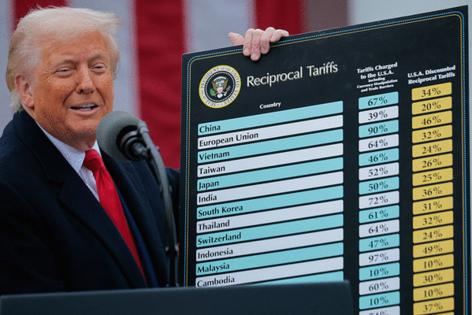US asks appeals court to let Trump tariffs remain for longer
Published in Political News
WASHINGTON — A federal appeals court is closer to ruling on whether to keep most of President Donald Trump’s global tariffs in place longer while the legal battle over them continues.
The Justice Department on Monday asked the U.S. Court of Appeals for the Federal Circuit to extend its earlier short-term pause on a lower court’s May 28 ruling that most of Trump’s tariffs are illegal. The government said that the ruling harmed the president’s ability to conduct foreign policy.
The Federal Circuit could now rule at any time on whether or not to pause the order for the duration of an appeals process that’s likely to last months. The administration has also indicated that it will go to the U.S. Supreme Court if the appeals court lifts the current hold.
In its filing, the administration argued that allowing the tariffs to be blocked would diminish “America’s bargaining position during sensitive trade negotiations, encouraging other countries to hold our nation hostage and catastrophically harm our economy.”
Ruling in a pair of lawsuits brought by a group of small businesses and Democratic-led states, a three-judge panel of the U.S. Court of International Trade last month found that Trump exceeded his authority to impose tariffs under the 1977 International Emergency Economic Powers Act.
Tariffs covered by the ruling include Trump’s global 10% levy, his April 2 “Liberation Day” tariffs and measures targeting China, Canada and Mexico over fentanyl trafficking. Other tariffs on steel, aluminum and automobiles were imposed under different laws and were unaffected.
In arguing against a longer pause, the small businesses and Democratic-led states that sued have pointed to public statements by administration officials downplaying the ruling and saying they have other means to impose tariffs. The administration pushed back on that argument Monday.
“Upending the existing tariffs at this critical juncture on the theory that the President can hypothetically impose other (less effective) tariffs later, under other authorities, also does nothing to solve the timing problem: The emergencies are looming now, negotiations are proceeding now,” the government said.
Several other lawsuits challenging Trump’s tariffs have been put on hold until the Federal Circuit rules. Last week, a lower court judge announced that he would let one case go forward over Trump’s decision to end a tariff exemption for small-value packages from China.
©2025 Bloomberg L.P. Visit bloomberg.com. Distributed by Tribune Content Agency, LLC.

























































Comments